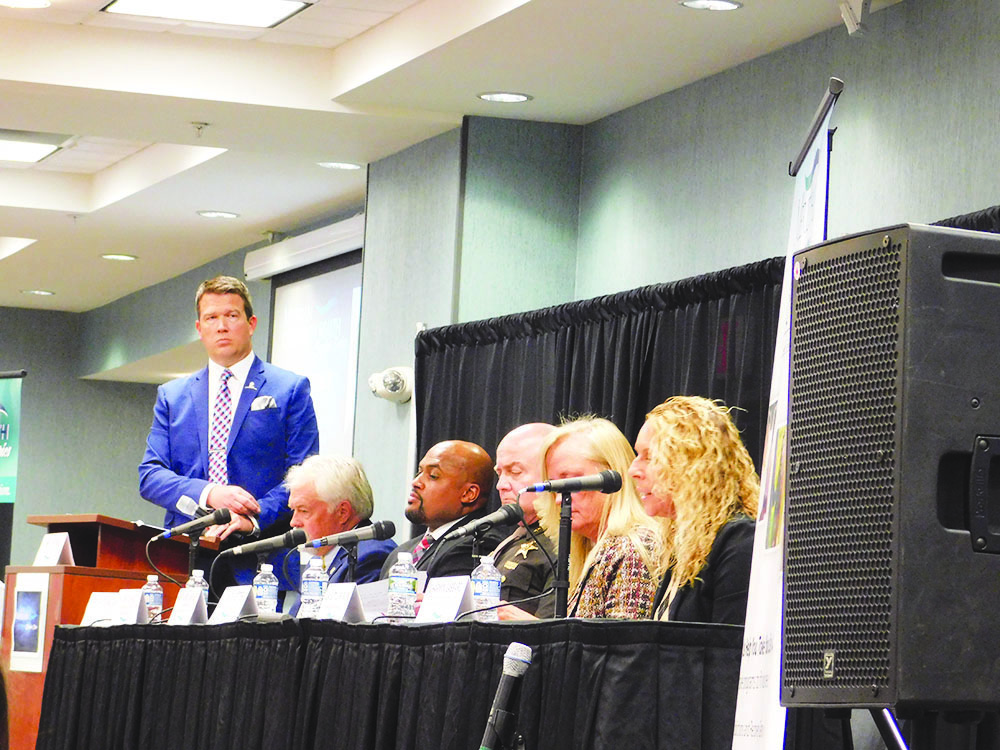Wayne County is moving away from solely locking up those battling addiction to viewing them as people who can be helped when they’re open to assistance.
Five area leaders in law enforcement, government, health care, education and harm reduction participated in a panel discussion Oct. 19 at Holiday Inn in Richmond as part of Meridian Community Health’s speaker series. Participants were Charmin Gabbard, executive director of Connection Café, harm reduction advocate and subject expert; Wayne County Sheriff Randy Retter; Richmond Community Schools Superintendent Dr. Curtis Wright; Lisa Suttle, regional vice president of clinical services for Meridian Health Services; and Dr. Brad Barrett, who is currently running for re-election as District 56’s state representative.
Retter said he’s proud that local law enforcement is moving beyond “warehousing” residents and instead helps them find resources to address their addiction and/or mental health concerns, because inmates often deal with one or both. “We don’t want to look at jail as closing a door, we want to look at it as opening the door to treatment,” Retter said.
For instance, with 24/7 medical staff in the jail, the sheriff’s office is working toward offering a medication assisted treatment program, he noted.
Wayne County had 409 drug overdose calls in 2020 and 433 in 2021 as the pandemic’s effects lingered. That pattern is similar to other communities, Retter said. The county’s number of 911 calls reporting overdoses has decreased to 295 so far this year.
While increased education about substance use disorder and free Narcan available to reverse overdoses could factor into the decline, Retter isn’t ready to celebrate. He’s seeing a transition away from opioids and back to meth, which has a reduced risk of overdose.
Barrett noted that while barriers to care are being removed through more telehealth opportunities, it’s also important to anticipate addiction trends and respond accordingly.
Barrett said increased use of stimulants instead of depressant opioids means more agitation and potentially more violence from users, so community awareness of that is important.
Saying a cake can’t be made with eggs alone, Retter believes the collaborative approach to prevention, treatment and support now being offered is the recipe for success, and that partnerships being developed over the next several years will keep reducing opportunities for the county’s drug culture to thrive.
Suttle said the local stigma surrounding addiction has decreased as more people realize that it can touch anyone, and organizations are discussing the issue and working together.
Gabbard noted Indiana’s expansion of services in recent years throughout all 92 counties, such as offering free talks with a recovery coach over the 211 helpline. Hoosiers can find more treatment centers, reduced barriers to medication assisted recovery. More resources also are available to help reduce barriers to the workforce, such as helping those without a permanent address get an ID.
Wright acknowledged that RCS and all Wayne County school districts grapple with trauma and addiction-related issues because their students mirror local society. Some of today’s young students were born with addictions to narcotics. Wright said he is hopeful that progress is being made in that area with the newly created NEST maternal treatment partnership between Reid Health and Meridian, which provides addiction recovery treatment to pregnant women and their children.
While educators continue teaching the detrimental effects of drugs and equipping students with the skills to refuse them, Wright said they also provide various social emotional supports to help youth at their most vulnerable points who are impacted by their own addiction or that of a loved one.
Wright noted a correlation between poor academic performance, trauma and drug use, and said the opportunity to help people begins with love, patience, grace and humility.
Panelists took a few questions from the audience. One participant asked about the possibility of Wayne County starting a drug court like Fayette County’s. Participants can go to a halfway house and have felonies removed from their record, giving them more opportunities to get a job and be successful in their communities, she noted.
Retter said Wayne County is looking into a drug court, with the ultimate decision resting with the courts and probation department rather than the sheriff’s office. He said local leaders are trying to be very progressive in finding programs that are right for Wayne County.
The event’s keynote speaker was Chris Herren, who formerly played for the Boston Celtics in the NBA but lost his professional basketball career to addiction. Herren, who described overdosing four times and damaging family relationships, discussed his difficult journey to sobriety in 2008 and how he continues to humbly stick with his plan of attending meetings. He believes it’s most effective to figure out why individuals could be tempted to try drugs and what they’re trying to escape in their lives, such as his own self-esteem issues and his father’s alcoholism.
Herren said the experience of going through recovery shouldn’t be viewed as punishment, because being sober has made him better in every facet of his life. He also called the phrase “rock bottom” reckless, saying it has prevented millions of earlier critical interventions because parents sometimes wait for their child to lose everything before seeking help, then expecting quick fixes after years of trauma.
Herren’s story, and information about the treatment center he now operates, can be found at HerrenProject.org. Anyone concerned that they or a loved one may be experiencing a substance use crisis can dial 988 for information and support.

